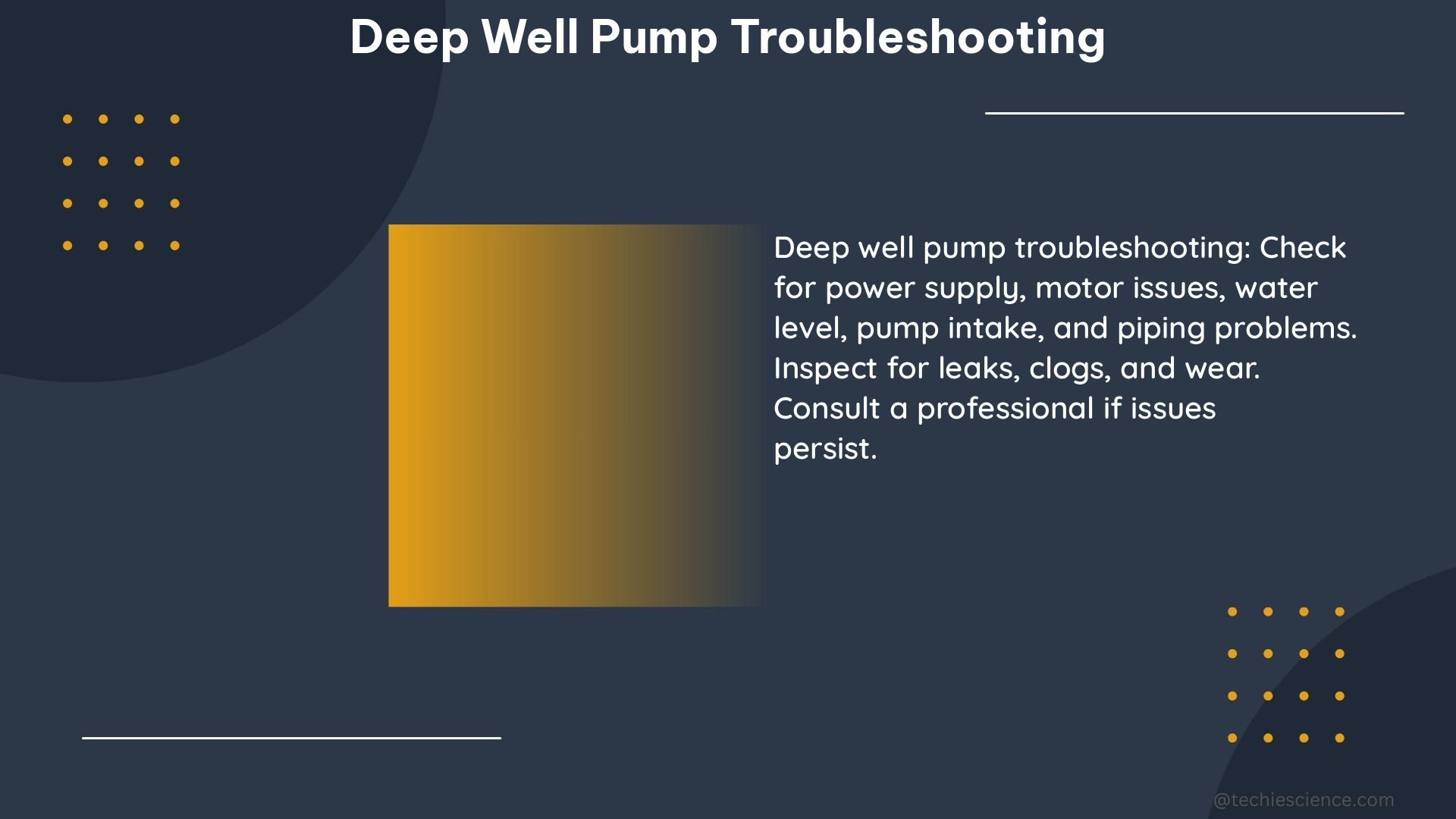Deep well pumps are essential for drawing water from deep underground sources, and troubleshooting these pumps requires a systematic approach. This comprehensive guide will provide you with the necessary tools and techniques to diagnose and resolve common deep well pump issues, ensuring your water supply remains reliable and efficient.
Voltage Measurements
Measuring the voltage at various points in the deep well pump’s electrical circuit is a crucial first step in troubleshooting. Use a high-quality multimeter to measure the voltage at the pressure switch, control box, and the well pump itself. Ideally, you should see 240V at the pressure switch and control box, but if the voltage drops significantly (e.g., to 24V) at the well pump, it could indicate a problem with the wiring or connections.
Current Measurements

Next, measure the current draw of the deep well pump using an ammeter. A properly functioning residential deep well pump should typically draw between 5-9 amps of current. If the current draw is significantly higher than this range, it may suggest an issue with the pump motor or wiring, such as a short circuit or a problem with the motor windings.
Resistance Measurements
Use an ohmmeter to measure the resistance of the windings in the deep well pump’s motor. A healthy motor should have a resistance value within the range of a few hundred ohms to a few thousand ohms. If the resistance is significantly higher or lower than this range, it could indicate a problem with the motor windings or insulation.
Pressure Measurements
Measure the water pressure at various points in the system, such as the pressure tank and the spigot. A healthy deep well pump system should maintain a consistent pressure, typically around 40-60 psi for a residential application. If the pressure is lower than expected, it may indicate an issue with the pump or the pressure tank.
Flow Rate Measurements
Measure the flow rate of water coming from the deep well pump. A properly functioning pump should deliver a certain flow rate, typically around 5-10 gallons per minute (GPM) for a residential well. If the flow rate is lower than expected, it could be a sign of a problem with the pump or the well itself.
Technical Specifications
Now, let’s dive into the technical specifications of deep well pumps:
- Motor Type: Deep well pumps typically use a submersible motor, which is designed to be submerged in water and operate in a wet environment. These motors are available in various horsepower ratings, typically ranging from 1/2 HP to 5 HP for residential applications.
- Well Depth: Deep well pumps are designed to draw water from depths of 100 feet or more. The maximum depth rating of a pump depends on the specific model and manufacturer, with some high-performance pumps capable of operating at depths of up to 600 feet.
- Pump Capacity: Deep well pumps are rated for a certain flow rate, typically measured in gallons per minute (GPM). The pump capacity depends on the horsepower of the motor and the depth of the well, with higher horsepower motors and shallower wells generally providing higher flow rates. Residential deep well pumps typically have a capacity of 5-20 GPM.
- Power Supply: Deep well pumps typically require a 240V power supply, although some models may operate on 120V or 480V. It’s essential to ensure that the power supply matches the pump’s specifications to avoid damage or improper operation.
- Wiring and Connections: Deep well pumps require specialized wiring and connections to ensure safe and reliable operation. The wiring should be rated for wet environments and the connections should be secure and watertight to prevent water intrusion and potential electrical hazards.
By understanding these technical specifications, you can ensure that you select the right pump for your application and perform proper maintenance and troubleshooting.
Reference
- Well Pump Troubleshooting and DIY Repair – Family Handyman
- Well Pump Troubleshooting – DoItYourself.com Community Forums
- Diagnose and Replace a Submersible Well Pump – Instructables

The lambdageeks.com Core SME Team is a group of experienced subject matter experts from diverse scientific and technical fields including Physics, Chemistry, Technology,Electronics & Electrical Engineering, Automotive, Mechanical Engineering. Our team collaborates to create high-quality, well-researched articles on a wide range of science and technology topics for the lambdageeks.com website.
All Our Senior SME are having more than 7 Years of experience in the respective fields . They are either Working Industry Professionals or assocaited With different Universities. Refer Our Authors Page to get to know About our Core SMEs.